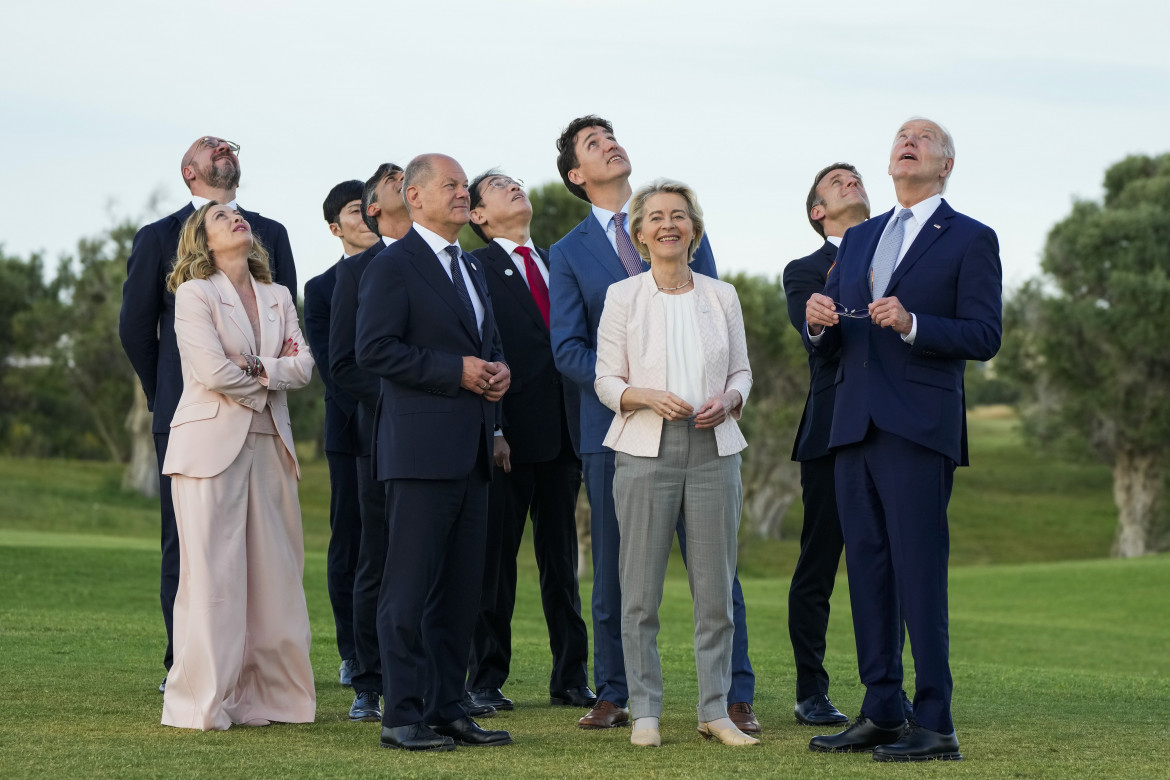Analysis
Meloni gets her way at the G7: war, Mattei Plan and ‘sovereign rights’
While the situation on the ground in Ukraine is more and more difficult, the document put together by the seven used the same watchwords we have often found in their speeches.

At the G7 meeting, Ukraine was the number one issue, as shown by the special role given to President Zelensky, the bilateral meeting between him and Joe Biden, and the summit’s focus on Russian aggression.
It was the same with the seven leaders’ final statement: “We reaffirm our unwavering support for Ukraine for as long as it takes.”
Then again, Ukraine is the only point of the document on which the seven – and especially the host, Giorgia Meloni – have any concrete achievements to show: the €50 billion loan covered by the interest on frozen Russian sovereign wealth funds – dubbed “Era: Extraordinary Revenue Acceleration Loans for Ukraine” – and the 10-year bilateral agreement with the United States. Complementing all this was the condemnation of Russia’s “brutal and unjustifiable war of aggression,” and its “irresponsible” appeal to nuclear rhetoric.
While the situation on the ground in Ukraine is more and more difficult, the document put together by the seven used the same watchwords we have often found in their speeches in recent days, which seem to highlight rather than dispel a serious underlying concern about the future course of the conflict. Thus, we read insistent assurances that it’s not true that “time is on Russia’s side,” that “destroying infrastructure and livelihoods has no consequences for Russia,” or that “Russia can prevail by causing Ukraine to fail economically.”
The not-so-subtle threats against China, which is supplying technology to Moscow that is being used to build weapons, were a recurring theme, both in the long chapter on Kyiv as well as in the entire chapter on the Indo-Pacific, which, in the diplomatic language used on these occasions, Beijing is framed as the source of instability throughout the region, from Taiwan to the Philippines and North Korea – with the exception of Myanmar’s military junta, which was deemed to deserve blame all on its own.
Of course, there was no chance that the persecution of Muslims by the newly re-elected Indian government led by Narendra Modi would make it into the document, on the day the Indian prime minister came to Borgo Egnazia (and held a bilateral meeting with Meloni in the evening) along with the other leaders invited as part of the so-called “outreach” – trumpeted for days as proof that the G7 is not a private club intended only for the rich and predominantly white – including Turkey’s Erdogan, Argentina’s Javier Milei and Brazil’s Lula.
The second-most-prominent theme in the final document was Gaza. However, after the dutiful condemnation of the Hamas massacre, the words used in defense of the rights of civilians in the Strip, as well as in the Occupied Territories, were more milquetoast than those already uttered on several occasions by the president of the United States in an attempt to stem Benyamin Netanyahu’s murderous and unscrupulous advance into the Gaza Strip, where almost nothing remains standing.
“We fully endorse and will stand behind the comprehensive deal outlined by President Biden,” the document reads, “that would lead to an immediate ceasefire in Gaza, the release of all hostages, a significant and sustained increase in the flow of humanitarian assistance throughout Gaza, and an enduring end to the crisis, with Israel’s security interests and safety for Palestinian civilians in Gaza assured.”
That, of course, would be the panacea for all ills. “We are deeply concerned by the consequences on the civilian population of the ongoing ground operations in Rafah,” the seven lamented as the offensive has already been underway for weeks, “and the possibility of a full-scale military offensive that would have further dire consequences for civilians.” They also tut-tutted at settler violence and paid the usual fealty to a two-state solution. There are also a few sentences on the fears of the conflict widening, from the Houthi-patrolled Gulf of Aden to Lebanon and Iran: Tehran “must cease its destabilizing actions.”
In third place, Meloni managed to put her own pet project, the Mattei Plan for Africa, under the heading “Fostering Partnerships with African Countries”: “We will reinforce mutually beneficial and equitable cooperation with African countries and regional organizations.” Accordingly, the G7 “welcome the Mattei Plan for Africa launched by Italy.” The counterpart, and counterpoint, could be found several pages further, in the “Migration” section.
The G7 leaders reiterated the same vague three-point recipe as always: “focus on the root causes of irregular migration” (sounding as ambitious as ever), “efforts to enhance border management,” and “safe and regular pathways for migration.”
However, the real core of the policy shines through further down: “we will step up our efforts to prevent and address irregular migration, counter the illegal activities that facilitate it, and tackle the challenges it poses to individuals and societies. We affirm the sovereign right of states to control their borders, as well as their prerogative to govern migration within their jurisdiction.”
The stress on the “sovereign right” is another achievement by Meloni, while Biden is reeling from the consequences of his disgraceful executive order shutting down the southern border of the United States, abandoning countless promises in the process. All in all, the Italian prime minister had her way on all fronts.
Originally published at https://ilmanifesto.it/retorica-bellicista-confini-e-affari-il-g7-formato-italia on 2024-06-15
